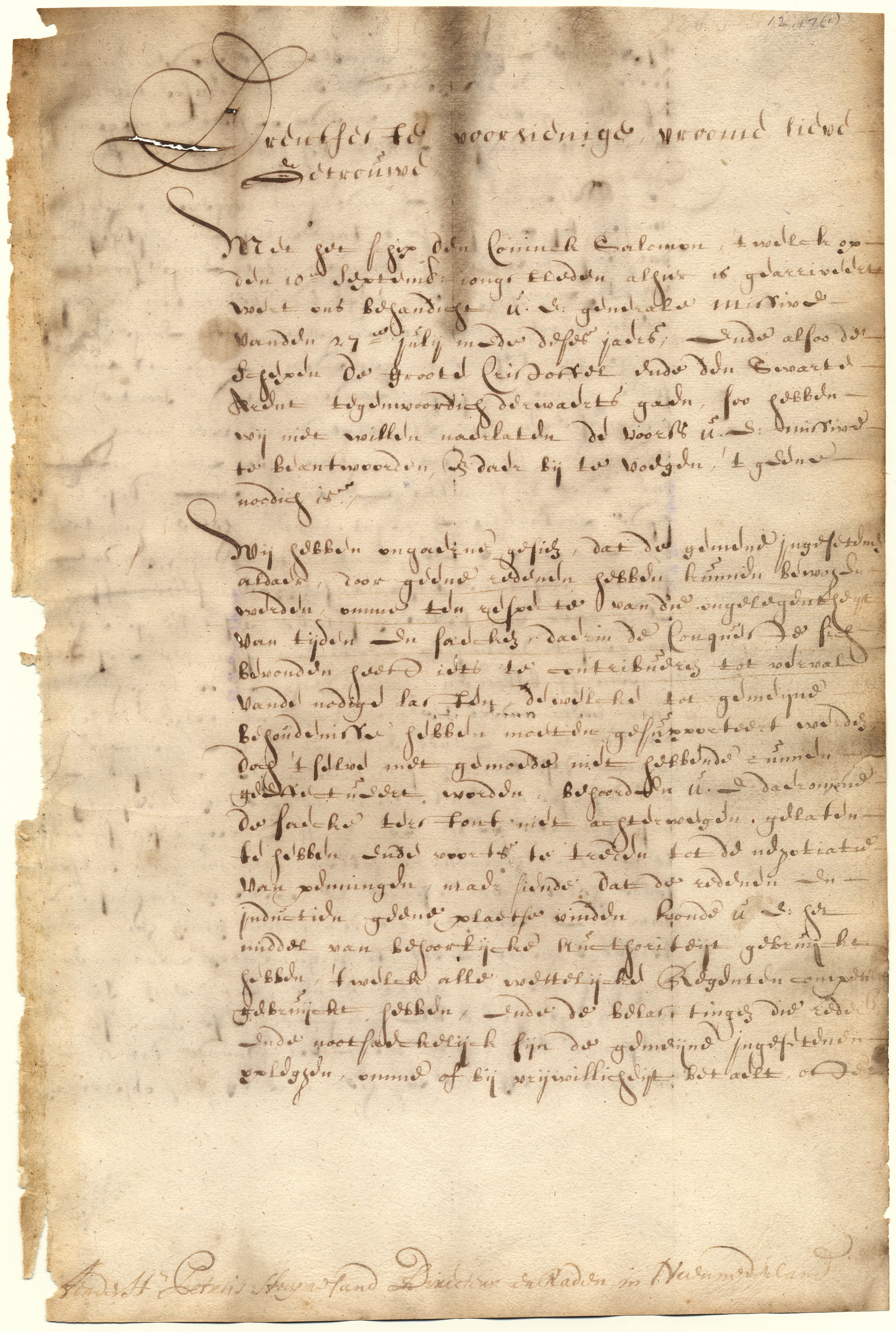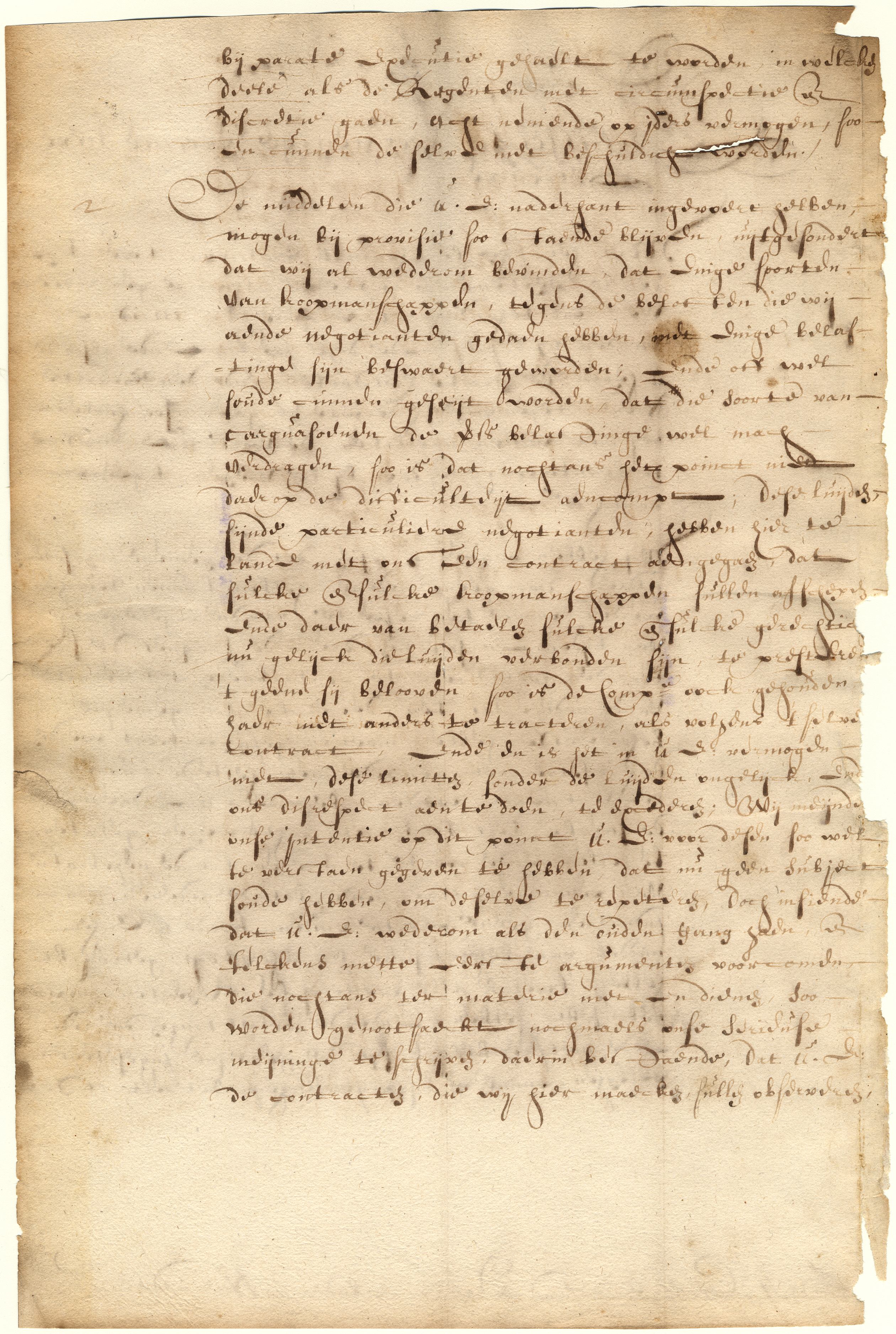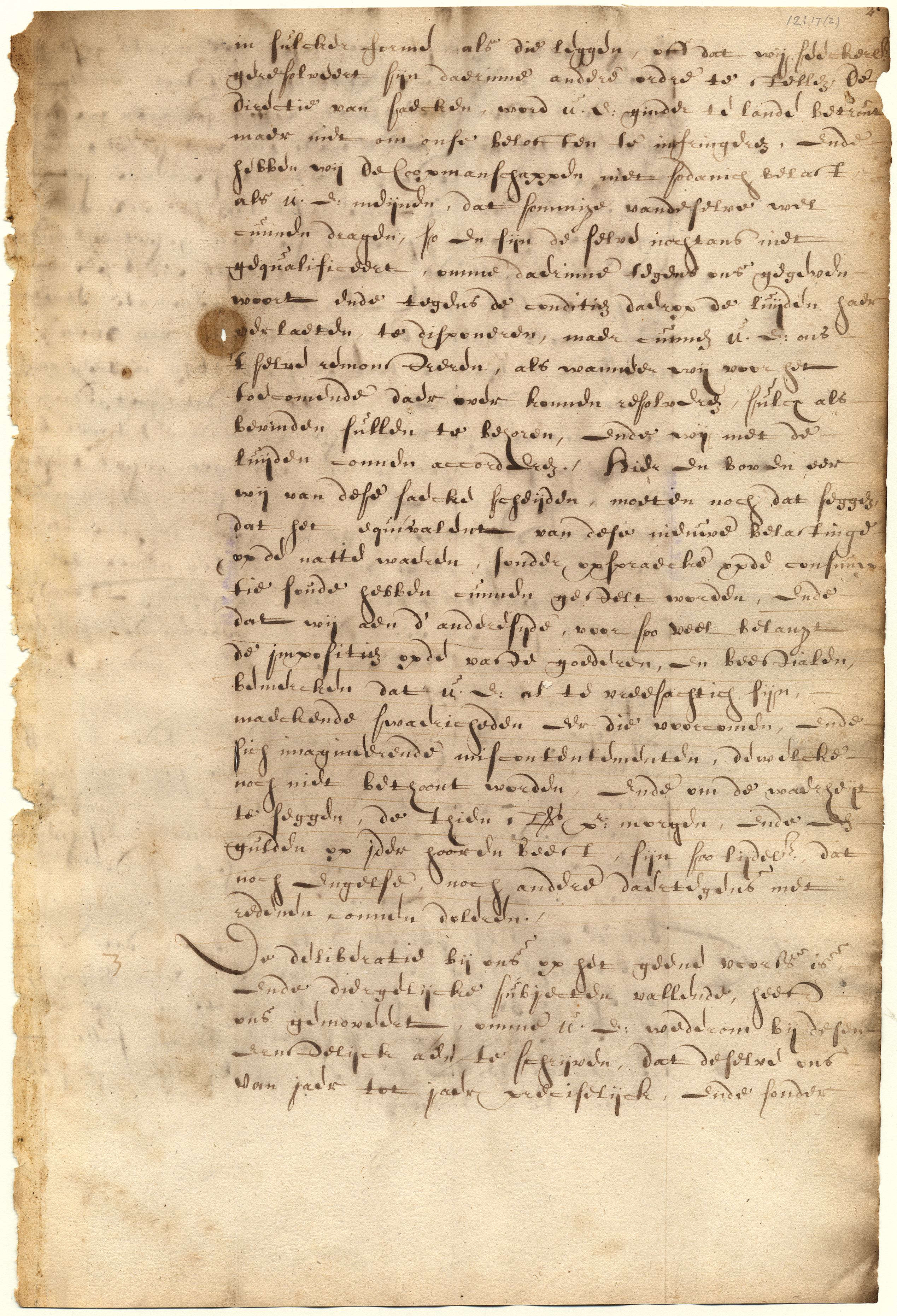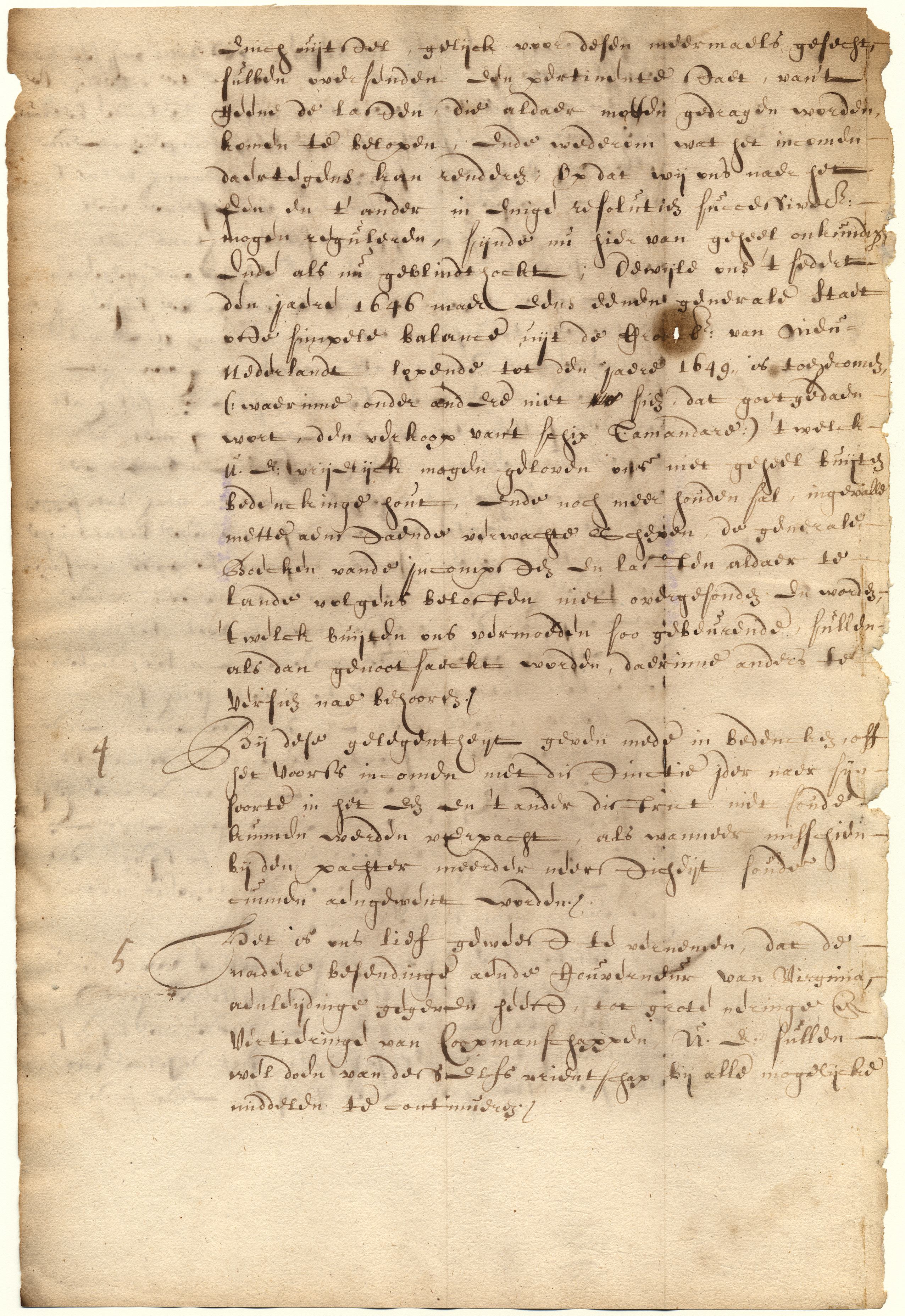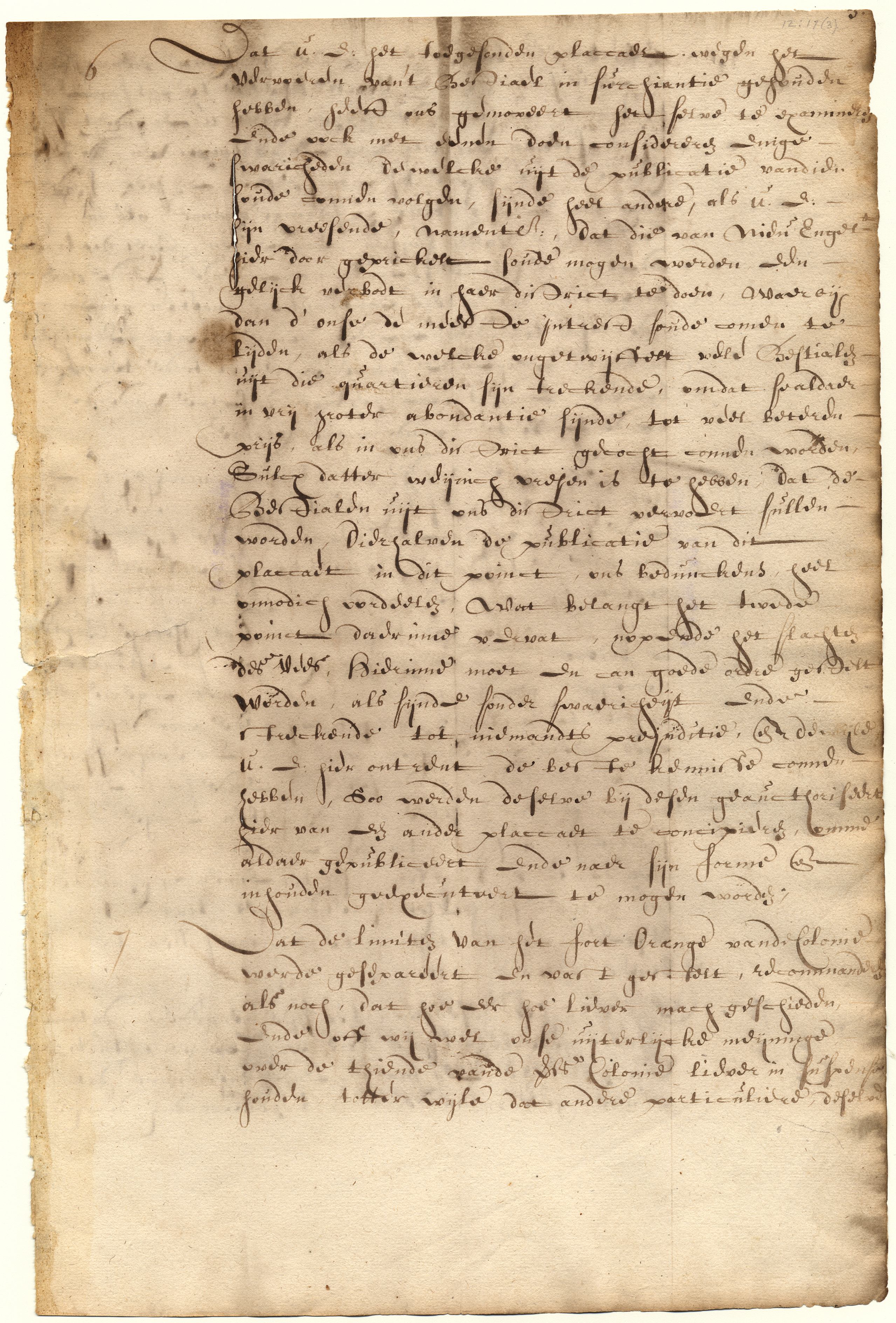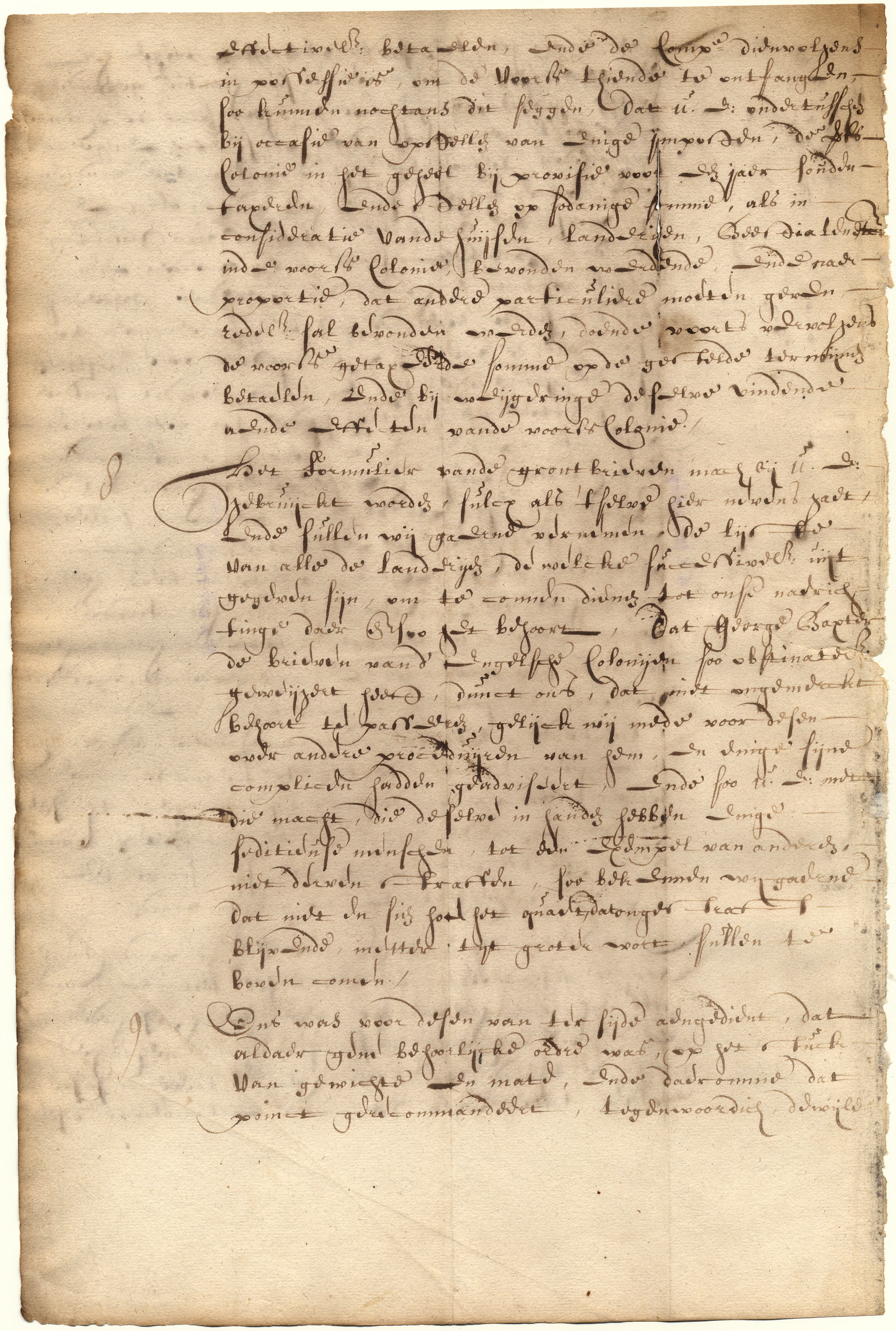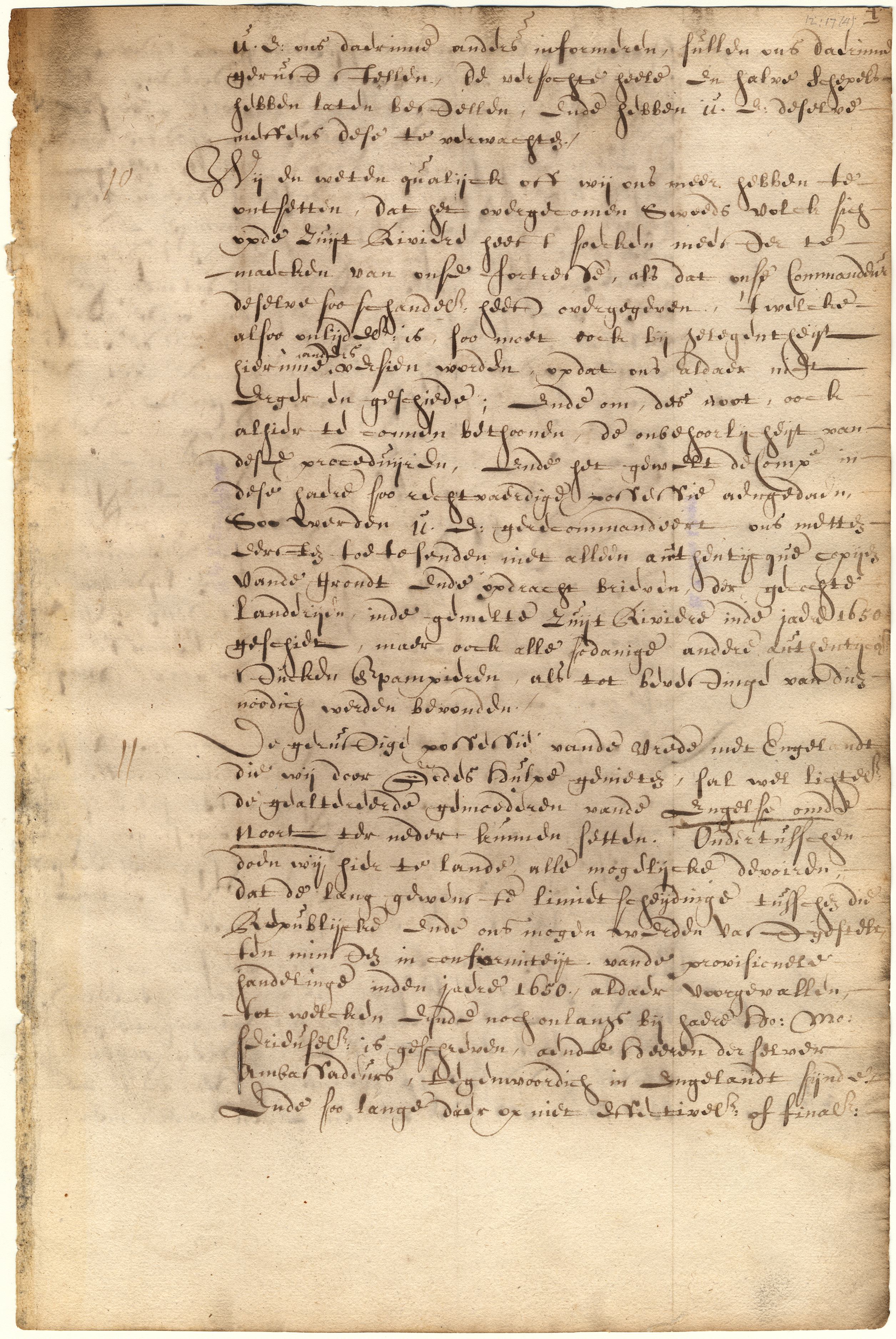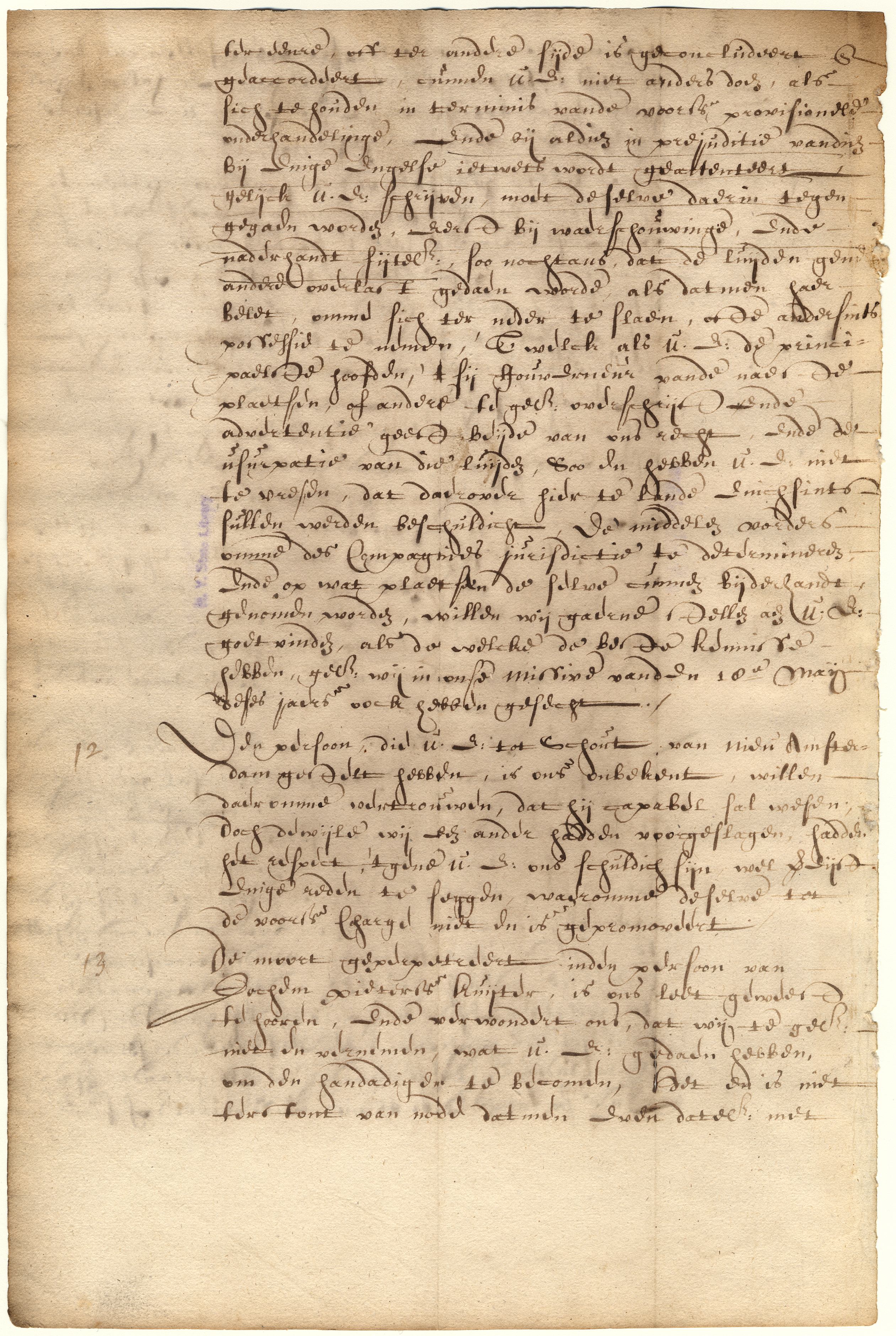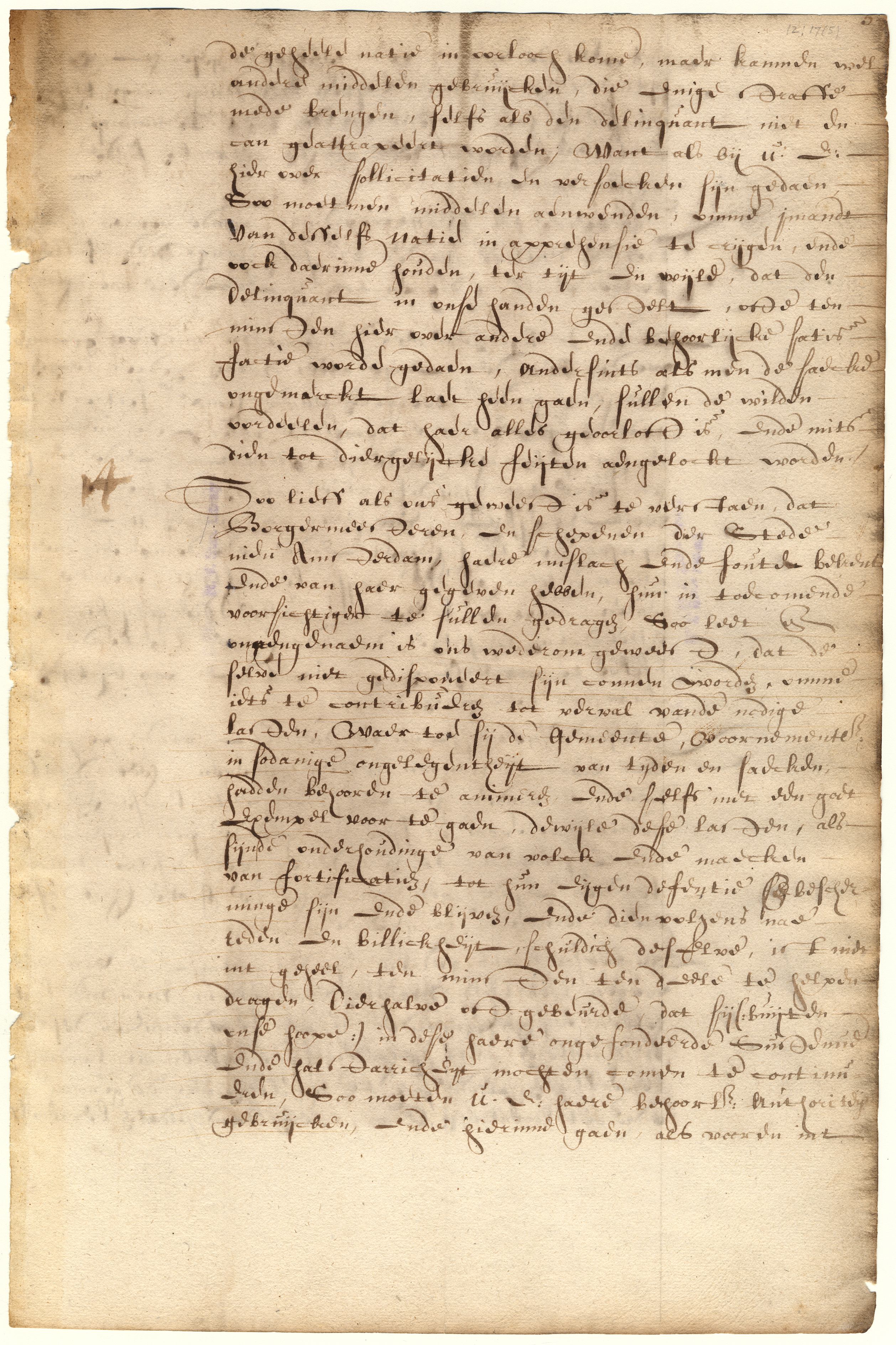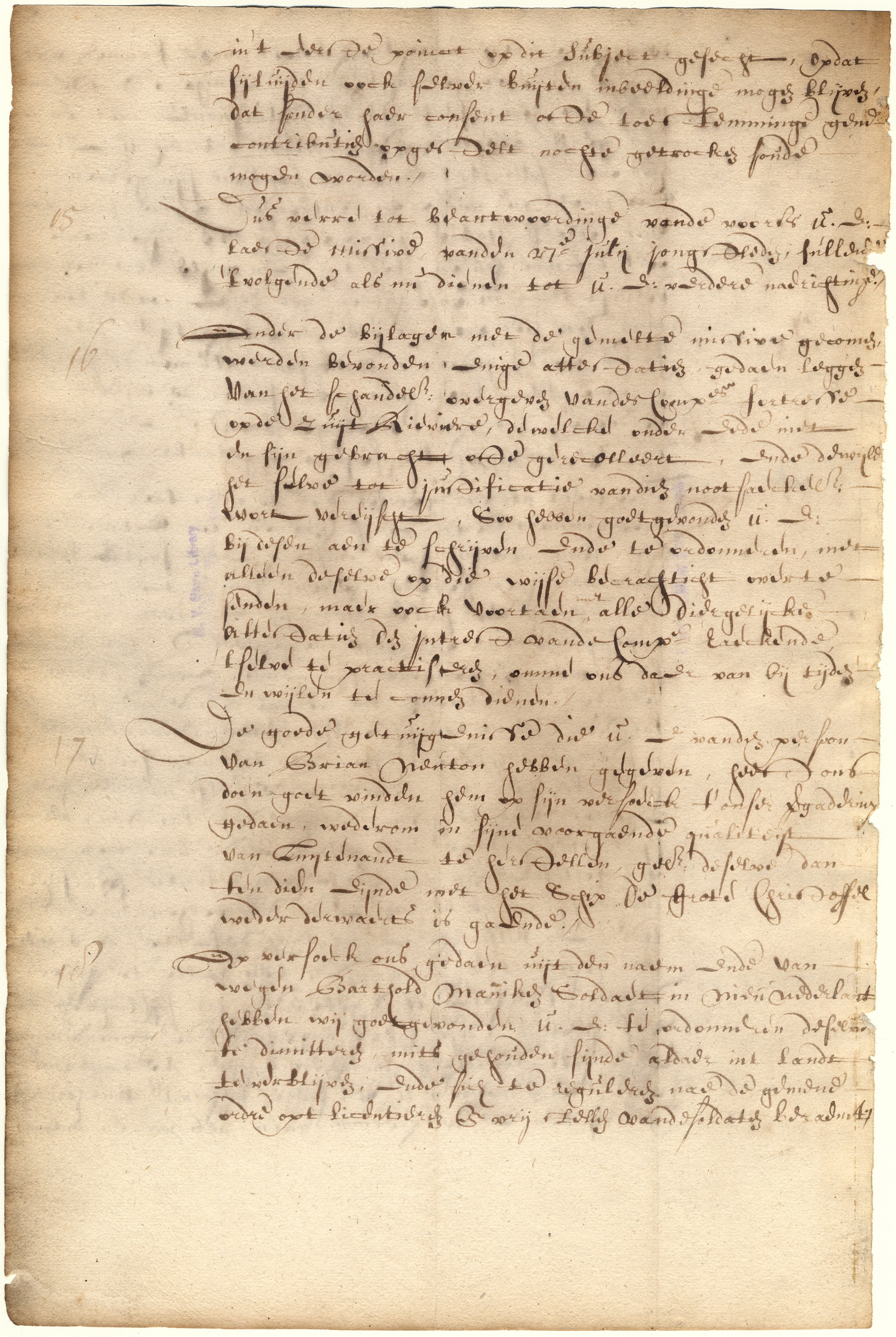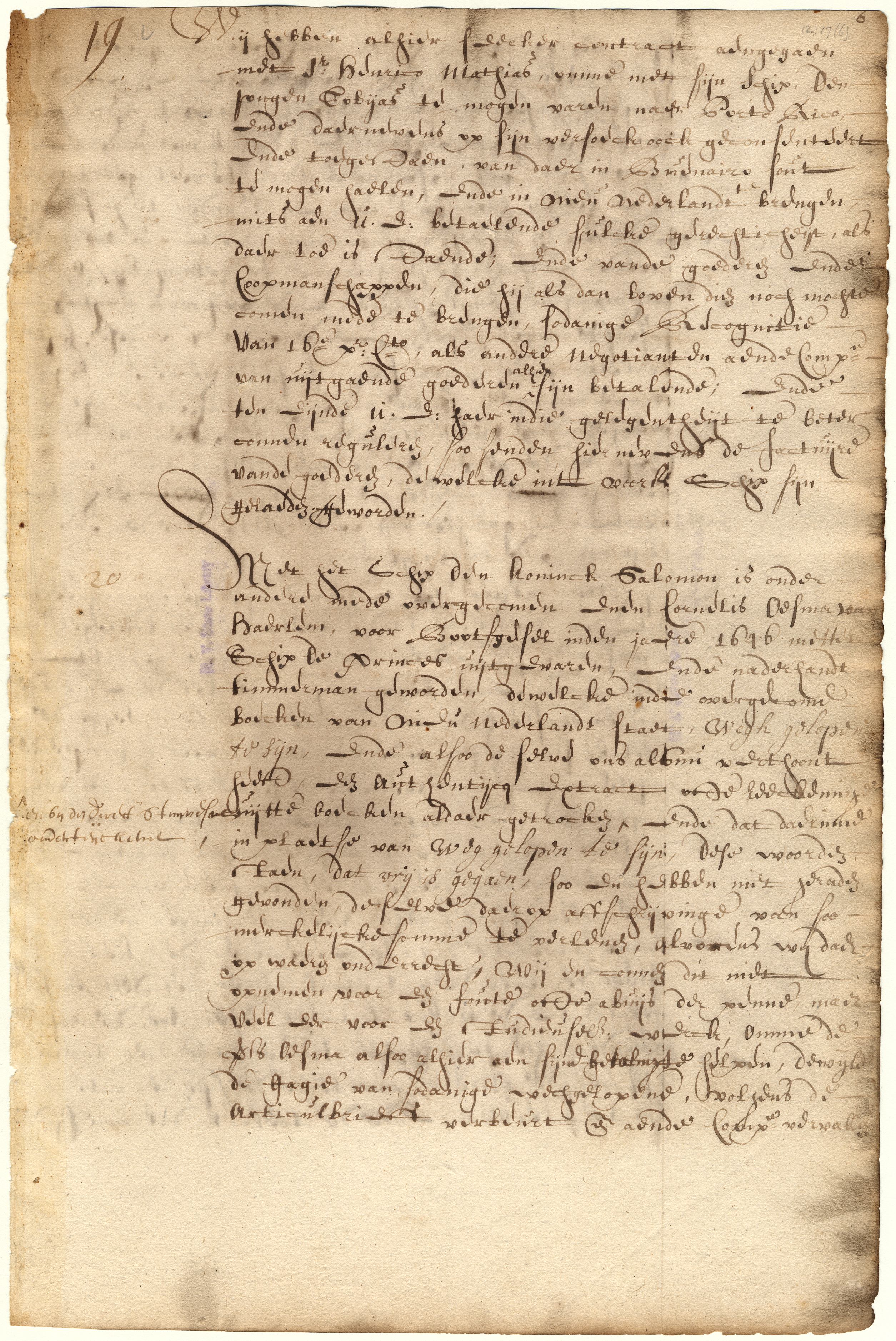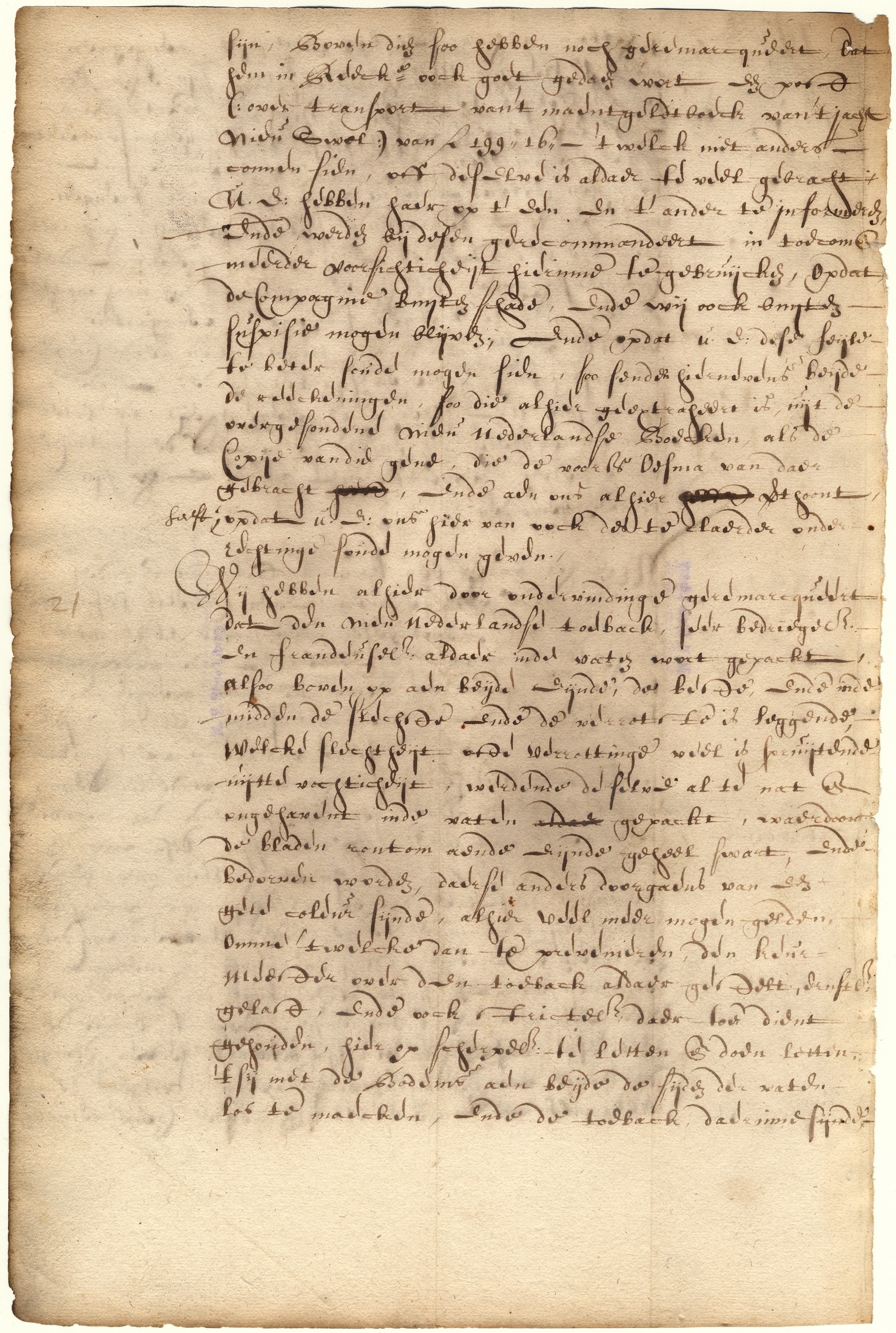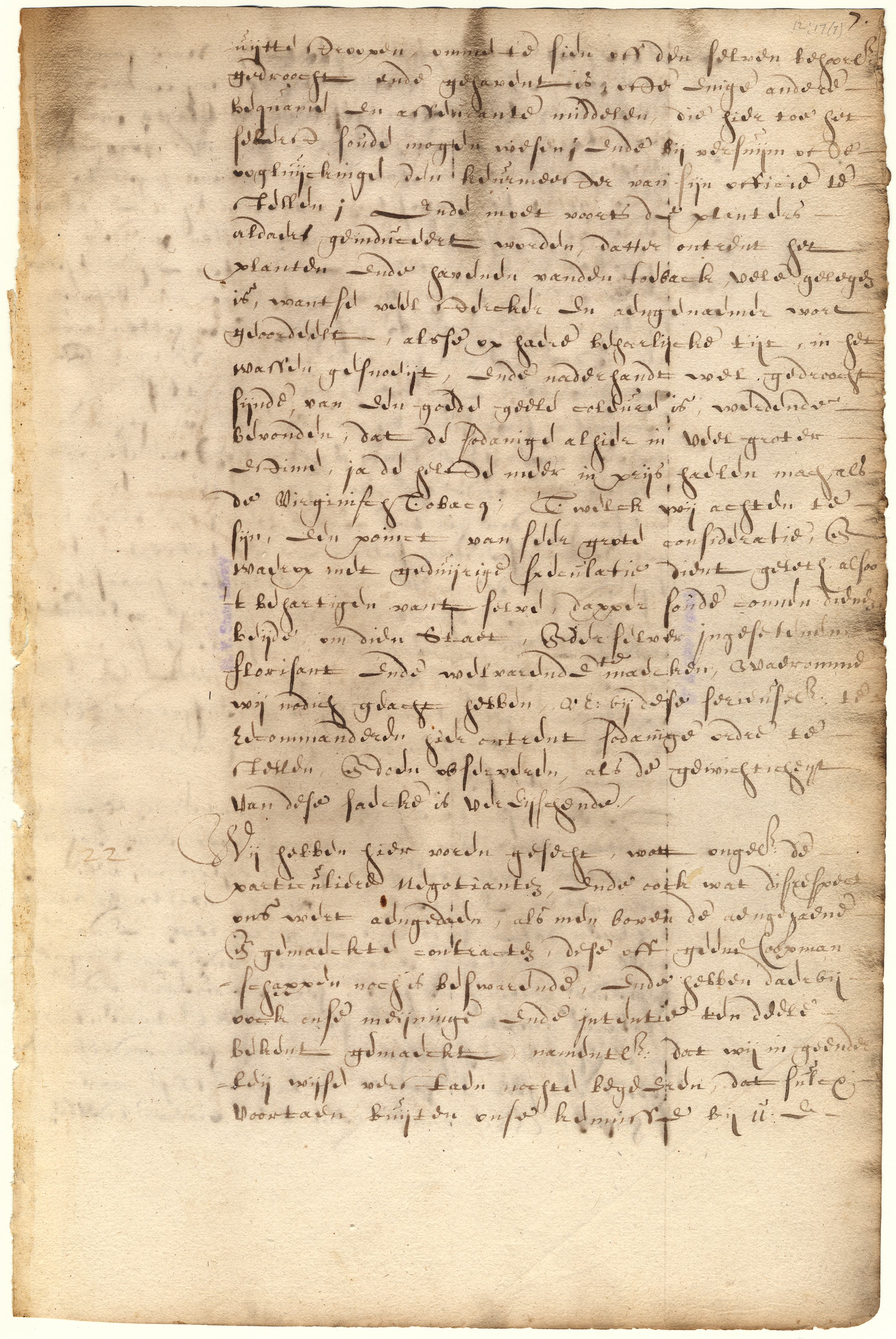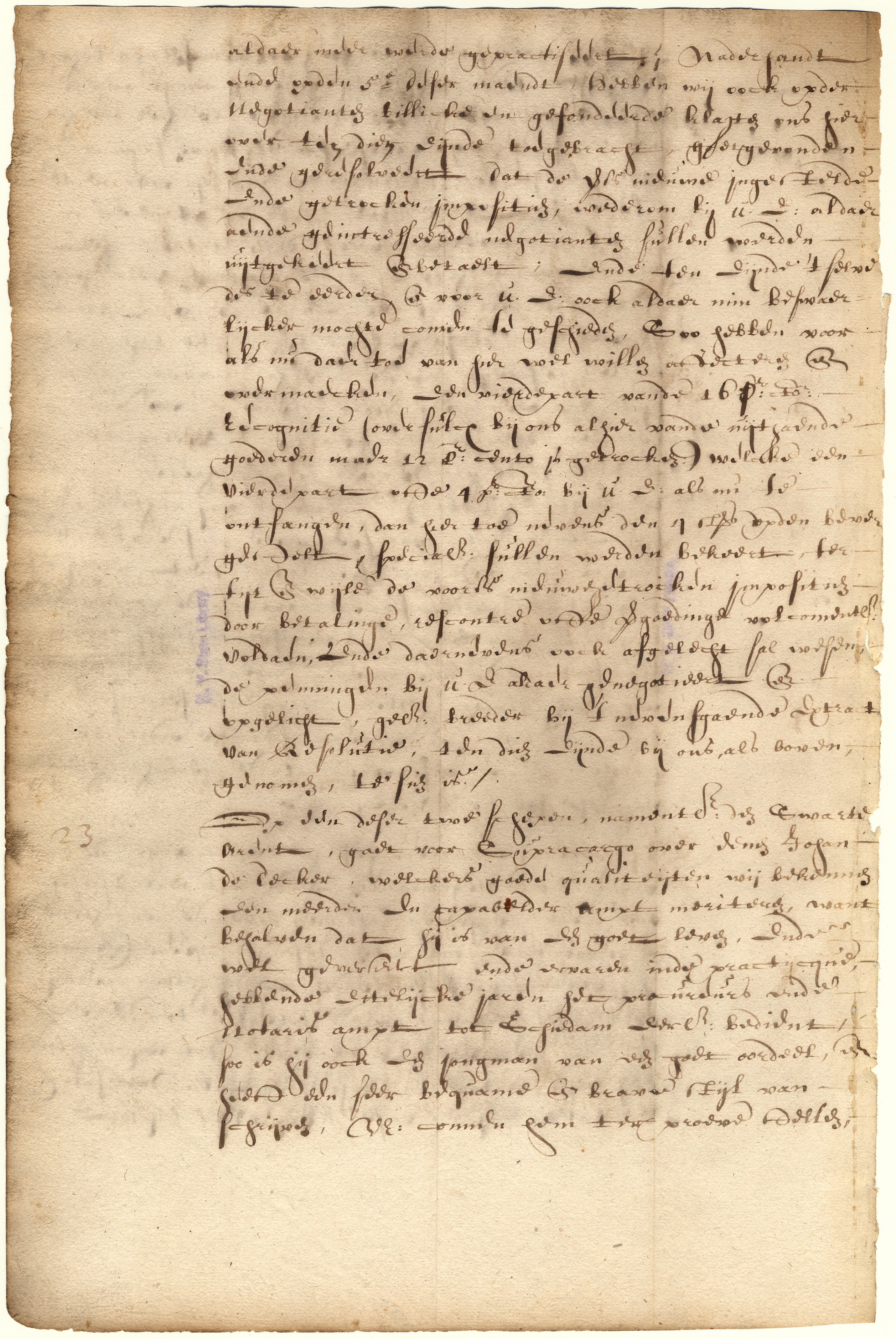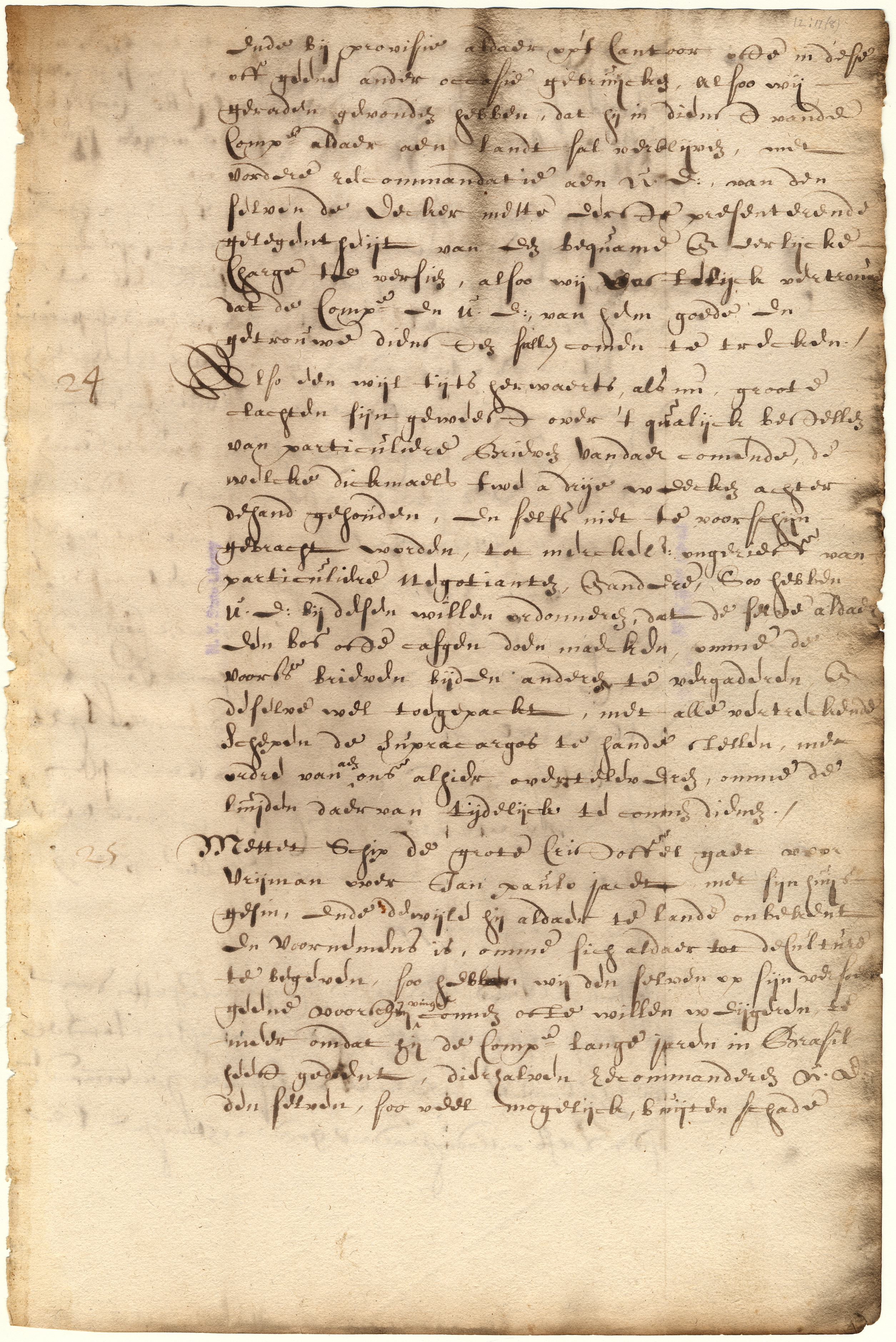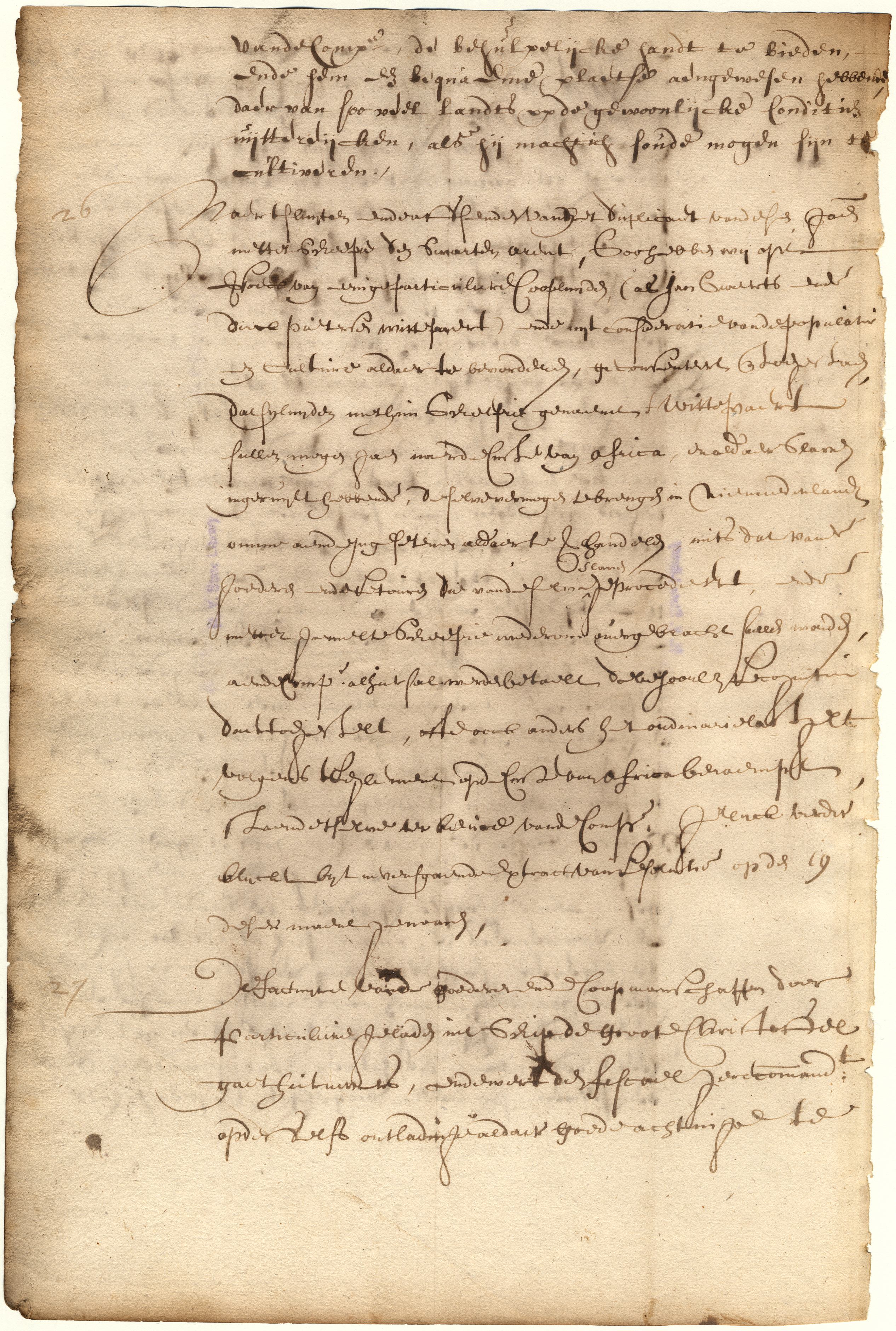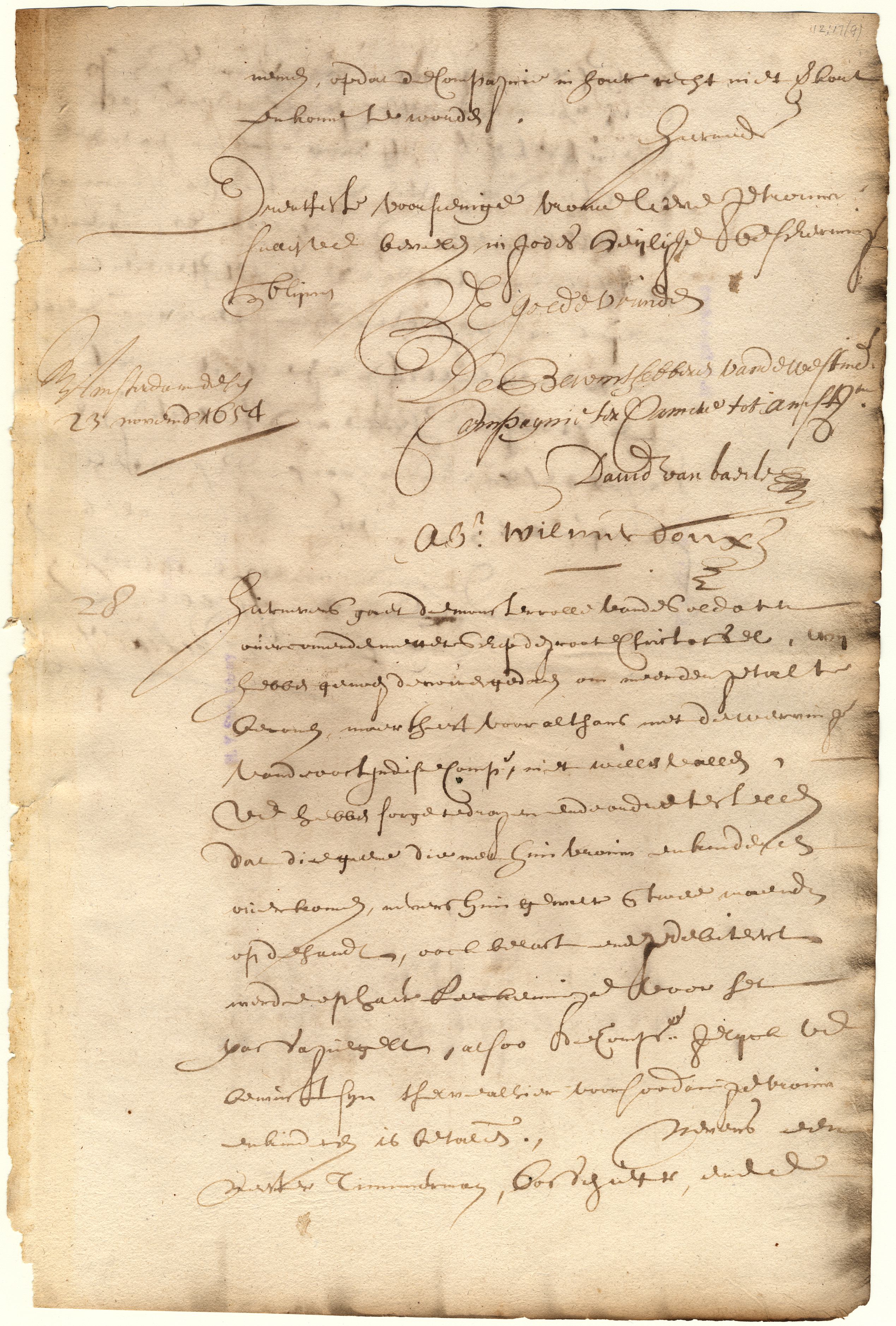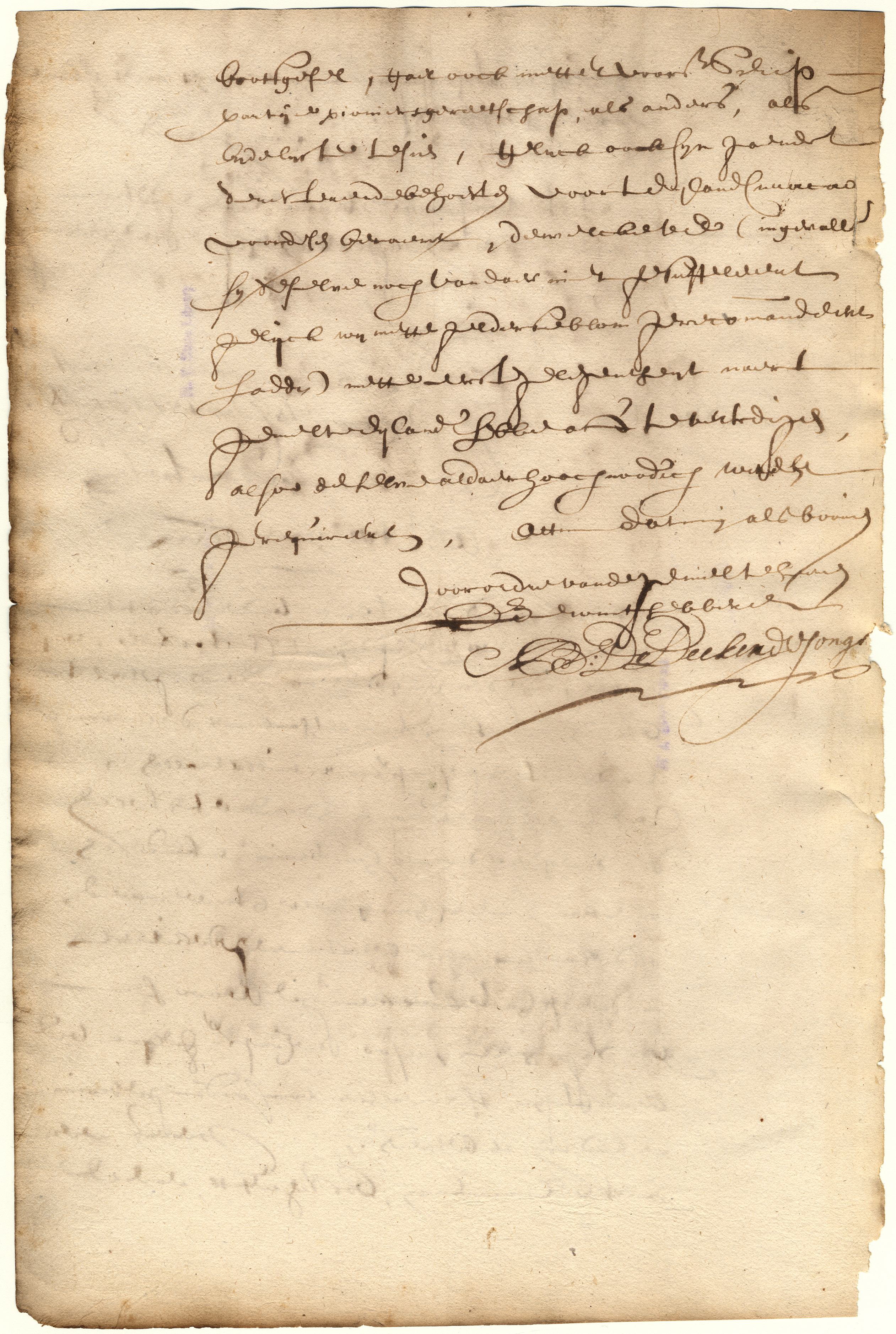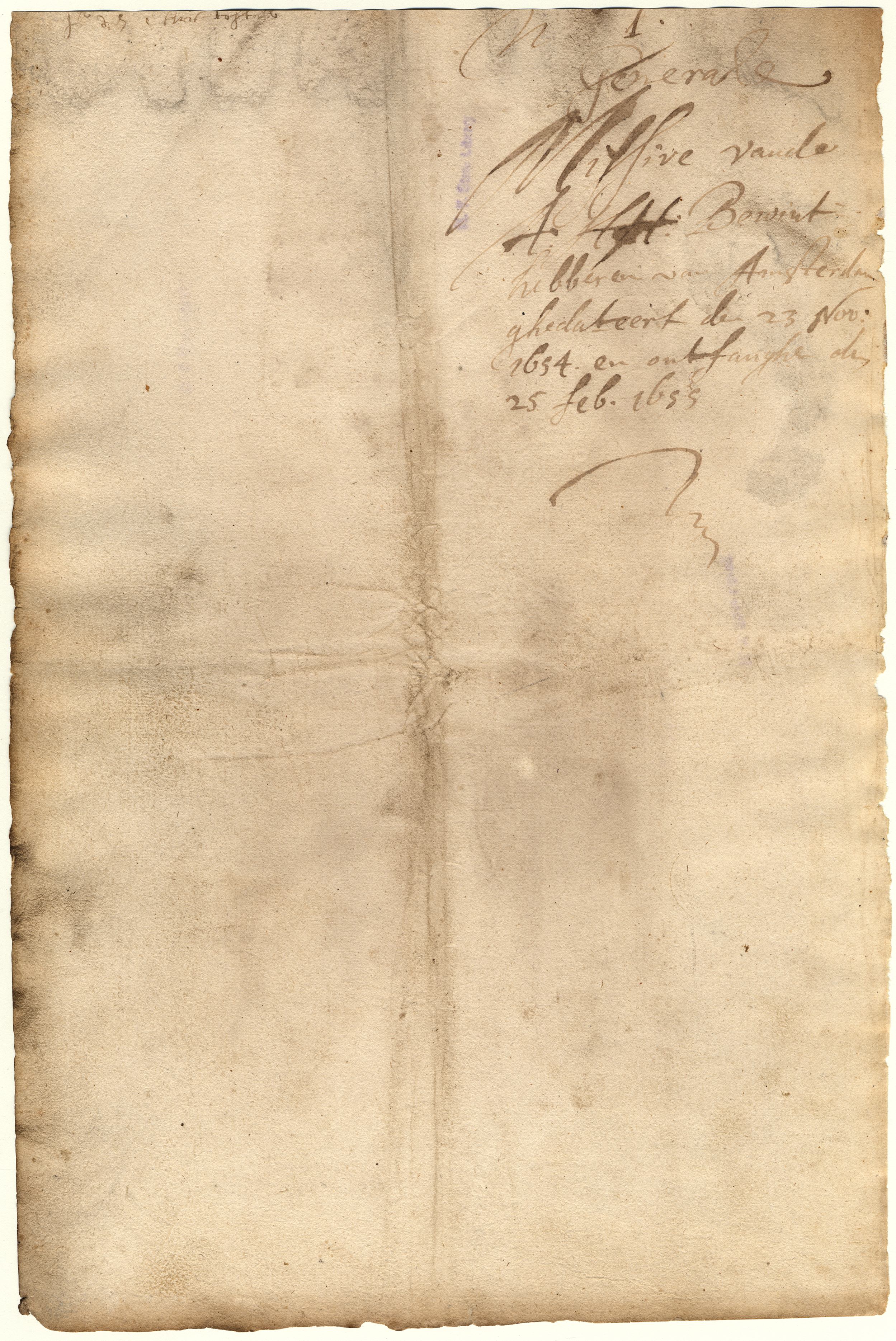1654, 23rd of November.
Honorable, Prudent, Pious, Dear, Faithful.
By the ship the Coninck Salomon, arrived here on the 10th of September last, we received your general letter of the 27th of July of this year,[1] and as the Groote Christoffel and the Swarte Arent are now ready to sail, we shall not let the opportunity pass without answering your letter and adding what is required
1. We have not been pleased to learn that the great mass of the inhabitants could not be persuaded by any arguments to consider the difficult position of the province at this time and contribute their share towards paying the expenses necessary for the safety of the whole community. But though it could not be done by appealing to their conscience, you ought not to have neglected this matter directly and entered into negotiations for a loan; seeing that reasons and inductions were unavailable, you should have made use of your proper authority, as all competent rulers would do, and imposed upon the community fair and necessary taxes either to be paid voluntarily or levied by execution. Under such circumstances the rulers acting with circumspection and discretion and considering the financial abilities of each individual cannot be blamed.
2. The measures introduced by you later are approved of for the present, except that we again find, that duties have been imposed on some articles of merchandise contrary to our promise, made to merchants here; although it may be said, that this kind of goods can bear an import duty, that is not the question, from which the difficulty arises. These people are private traders, who have contracted with us that they are to ship such goods paying such duties on them. As they are held to their part of the contract, the Company must not deviate from the same in their treatment of them and you have therefore not the power to exceed these limitations, without causing loss to the shippers and bringing us into discredit. We thought, that we had before now explained our position in this matter so well that there need not be cause for repeating it, but seeing that you go again over the old road and every time make use of your former arguments not at all pertinent to this case, we are compelled to give you once more our serious opinion, namely, that you are to observe the contracts, made by us here, to the letter and that we are firmly resolved, if you do not, to take other measures. The administration of affairs in New Netherland has been entrusted to you, but you are not to upset our promises, and even if we levied such duties on goods, as you think that they can bear, you are not qualified to give orders contrary to our promise and to the conditions, upon which the people rely; you may remonstrate to us and then we shall adopt such measures for the future, as we deem necessary and to which we can make the shippers agree. Before we leave this topic, we have to add that the equivalent of this new duty on spirits might have been collected from the consumers without objection and that we notice on the other side in regard to the imposts on real estate and cattle that you are altogether too timid, raising difficulties, before they exist, and imagining dissatisfaction, which is not apparent. In fact, the tax of 10 stivers per morgen and one guilder for each head of cattle is so moderate that neither the English nor others can reasonably complain against it.
3. The consideration of the foregoing and similar points has induced us to direct you again most seriously, to send us every year promptly and without any delay, as we have repeatedly desired, a correct statement of the amount of expenses, which must be paid there, also what the revenues received amount to, so that we may govern ourselves in our successive resolutions accordingly. At present we have no knowledge of these matters whatever and grope about as if blindfolded, for since the year 1646 we have received only once a general statement or simple balance sheet extracted from the ledgers of New Netherland running into the year 1649, (in which among others we fail to find the credit item for the sale of the ship Tamandare). You may be quite sure that we have our suspicions, which will only increase, if by the ships now due the general records of revenues and expenses there are not sent over as promised.
Should we be disappointed, which we do not expect, then we shall be obliged to adopt other means, as is duty bound.
4. We wish you to consider, whether the aforesaid revenues, each service being taken separately, might not be farmed out in one or the other district, for we think a farmer of the revenues would pay more attention to their collection.
5. We have been glad to learn that the last embassy to the governor of Virginia has been the inducement for extensive trade and sale of merchandise. You will do well to cultivate this friendship by all possible means.
6. Your action in suspending the placard sent you concerning the exportation of cattle has led us, to examine the same and we are considering some difficulties, which might arise from its publication. They are not the same as those, of which you are afraid, namely that the New England people might be instigated by it to publish a similar prohibition in their country, whereby our people would suffer the most, as undoubtedly they draw many animals from that quarter, where there area larger number of them and can be bought at more advantageous prices than in our Province. There is little fear, therefore, that cattle will be exported from New Netherland and we consider the publication of this placard on this point quite unnecessary, as to the second point contained in it, concerning the slaughtering of cattle, good rules must and can be made, as there is no difficulty and it will not prejudice any one. You have herein the best experience and are therefore hereby authorized to draw up another placard concerning this matter to be published and executed pursuant to its form and tenor.
7. Regarding the running and determining the boundary line between Fort Orange and the Colony, we recommend that it be done the earlier the better and although we prefer not to express our final opinion on the tenth to be paid by said Colony, until other private parties actually pay theirs and the Company is in a position to receive the said tenth; yet we must say, meanwhile, when you impose some new taxes, you should assess the Colony provisionally for one year in the aggregate and to such an amount, as considering the buildings, land and cattle in the Colony, private settlers would pay in proportion: according to this assessment they must immediately pay their taxes and if they refuse the property of the Colony must be levied upon.
8. You may use the enclosed form for patents and we shall be glad to receive a statement of all the lands successively granted, to be used for our information, as it ought to be. We think more attention ought to have been paid to the obstinate refusal of George Baxter to deliver the letters of the English colonies; we have already written about former proceedings of him and some of his accomplices. If with the power you have, you do not dare to punish a few seditious persons as a warning example to others, then we willingly admit that we see no way of suppressing evils, which if they remain unpunished gradually increase in strength.
9. We had been informed that no order existed in the use of weights and measures and had therefore written you on this matter. As now however we have your differing advice; we are at ease about it and have ordered the desired whole and half skipple measures, which you may expect with this letter.
10. We do not know what has astonished us most: that the newly arrived Swedish troops have endeavored to take our fort on the South River or that our commander has surrendered it so infamously. This cannot be tolerated; when occasion offers, other measures must be adopted, so that we may not fare worse. In order to prove here, when necessary, the impropriety of these proceedings and the violation of the Company's title to their lawful property, you are directed to send us by the first ship not only authenticated copies of the conveyances and title deeds for the lands on the South River bought in 1650, but also all such other authenticated documents and papers as are required for strengthening our hands.
11. The undisturbed peace with England, which we enjoy by the help of God, will easily appease the corrupted minds of the English to the North. Meanwhile, we do here our best to obtain the long desired settlement of the boundary between the Republic and us, at least in conformity with the provisional negotiations of 1650. Their High Mightinesses have only lately written an urgent letter on this point to their ambassadors now in England and as long as no effective or final decision one way or the other has been agreed upon, you can do nothing else but conform strictly to the terms of the aforesaid provisional agreement. If however some Englishmen make attempts prejudicial to the agreement, as you write, you must oppose them, first by warning them off, then by force; however so only that no other trouble is caused to the people, then that they are prevented from settling or otherwise taking possession. If you write to their principal men, either the governor of the nearest places or others and give notice both of our right and the usurpation by their people, you need not fear of being blamed for it here. We leave the further measures to determine the jurisdiction of the Company and when they can be carried out, to your discretion, for you have the best information, as we have already said in our letter of May 18th.[2]
12. We do not know the person whom you have appointed schout of New Amsterdam and trust that he is a capable man; but as we had proposed somebody else, the respect, due from you to us, demanded it that you gave some reasons, why he was not appointed as proposed.
13. We are sorry to hear of the murder of Jochem Pietersen Kuytert[3] and are astonished that we do not learn what you have done to arrest the criminal. It is at present not necessary to go to war with the whole tribe, but other means might be used carrying punishment with them, even if the delinquent cannot be taken. Because if you have asked and solicited (in vain), you must endeavor to capture a member of the same tribe and keep him in prison until the real delinquent has been placed in our hands or at least other and full satisfaction is given. If the matter is passed over without notice, the savages will believe that every thing is allowed to them and they will be induced to more such deeds.
14. Pleased as we have been to learn that the burgomasters and schepens of New Amsterdam have become convinced of their errors and have promised to be more cautious henceforth, it has nevertheless grieved us that they could not be persuaded to contribute their share to the general expenses, to which they ought to have induced the community especially in these bad times, setting a good example themselves, because these expenses, the support of the military and the repair of the fortifications, were incurred for their own defense and protection. They are therefore reasonably and fairly bound to bear if not the whole, at least a share of it. If it should happen, against our expectation that they continue so unreasonably obstinate, you must make use of your authority and proceed as we have said before on the first point, so that they may not longer imagine that without their consent or approval no contribution can be assessed or levied.
15. Thus far in answer to your aforesaid last letter of the 27th of July;[4] what follows is to give you further information.
16. Among the enclosures received in the said letter we found several depositions concerning the infamous surrender of the Company's fort on the South river, which are neither sworn nor attested. As this is necessary for its justification, we have concluded to write and order you not only to send them over duly authenticated, but also henceforth to do the same with all other depositions concerning the Company's interests that we can make use of them in due time.
17. The favorable report, which you have given us of Brian Newton, has induced us to reappoint him on his petition made to our board to his former charge of Lieutenant. He now goes for this purpose in the Grote Christoffel to New Netherland.
18. Upon request made to us in the name and on behalf of Barthold Maniken, soldier in New Netherland, we have resolved to order your honors to discharge the same, on condition that he remain there in the country and comply with the general order enacted for the release and discharge of soldiers.
19. We have made here a contract with Sr. Henrico Mathias, who is to sail with his ship the Jonge Tobias to Puerto Rico; upon his request we have also given him permission to bring salt from Buenairo to New Netherland on condition of his paying to you such duties as are imposed and on the goods and merchandise, which he may bring besides, 16 percent, as other traders pay here to the Company for outgoing goods. In order that you may be better informed in this matter, we are sending you as an enclosure the invoice of the cargo of the aforesaid ship taken in here.
20. With the ship the Koninck Salomon has come over, among others, a certain Cornelis Oesma van Haerlem, who sailed out as boatswain aboard the ship the Princes in the year 1646, and afterward became a carpenter. In the transmitted books of New Netherland he is listed as "run away"; and whereas the same has shown us now an authentic extract or account drawn from the books and signed by Director Stuyvesant which instead of "run away" has the words "gone free," therefore, we deemed it unadvisable to grant the same a write off of such a considerable sum before being informed thereon. We cannot consider it an error or slip of the pen but more of a zealous act to help the aforesaid Oesma here in his payment, as the salaries of such runaways, according to the articulbrief!,[5] is forfeited and reverts to the Company. Moreover, we have observed that he was allowed on account an item of ƒ199: 16:-(carried over from the book of wages of the yacht Nieu Swol), which we cannot see otherwise than the same is excessive. Your honors are to be apprised thereof and are hereby advised in the future to exhibit more caution herein so that the Company remain undamaged and we above reproach; and so that your honors may better see these failings, we send hereby both accounts as extracted here from the transmitted books of New Netherland, namely, the copy of those which the aforesaid Oesma brought from there and presented to us here, so that your honors may also give us more exact information thereon.
21. Experience has taught us that New Netherland tobacco is packed in hogsheads very deceitfully with the intention to defraud, for the top layers at both ends are of the best quality, while in the middle the worst and most rotten is packed. The bad condition and rottenness originated through moisture, as the tobacco is packed too damp and not sufficiently cured, which causes the leaves to tum black at the edges and spoilsthem, while if they retain their yellow color throughout they bring a much higher price. To prevent this the inspectors of tobacco should be directed and strictly held to keep a close watch either by opening the hogsheads at both ends and taking out the tobacco to see whether it is dry and well cured or by some other convenient and safe means, which are considered best; in case of neglect or connivance the inspector, must be removed from office. Further, the planters there must be informed that much depends on the cultivating and curing of the tobacco, for it is considered much stronger and pleasanter, when it is pruned in time, during its growth; and if after drying it has a good yellow color, it has been found to be valued much higher bore, bringing one half as much more than the Virginia tobacco. We believe this to be a matter of considerable importance, to which all possible attention ought to be paid. If well taken to heart, it may make the commonwealth and its inhabitants flourishing and wealthy. We deem it therefore necessary, to recommend to you most seriously, to make such rules and see to their enforcement, as the importance of the matter requires.
22. We have already referred above to the damages done to private traders here and the disrespect to us, if, contrary to concluded agreements, merchandise is taxed and we have at the same time expressed our opinions and desires; especially that we by no means understand or wish this to be done there by you without our knowledge. Later, on the 5th of this month, we have resolved upon just and well founded complaints made to us here by traders that the said newly imposed and collected duties shall be refunded there by you and that this may be done so much sooner and with the least inconvenience to you we shall remit to you now one fourth of the 16 percent duty (so that we retain here only 12 percent for goods shipped to New Netherland), which fourth part or 4 percent received by you now, together with the four stivers on beavers, shall be specially deposited and used, until the said newly imposed duties have been completely refunded by direct payment, counter charges or other indemnifications; furthermore, the loan negotiated and raised by you there must also be liquidated out of these funds, as the enclosed extract from the resolutions, adopted by us in this matter, will tell you.
23. Upon one of these two ships, the Swarte Arent, goes as supercargo Johan de Decker, whose abilities, we admit, deserve a better and higher position; for besides being a well-conducted man, experienced in business, having served faithfully for some years as attorney and notary at Schiedam, he is a young man of sound judgment and writes a most capable and accomplished style. You may try him and employ him provisionally in the office or in some other place, for we have concluded that he shall remain there in the Company's service, recommending that at the first available opportunity you give to the said Decker a proper and decent appointment, for we are confident that the Company and you will be benefitted by his good and faithful services.[6]
24. Whereas some time ago, and again now, great complaints have been made concerning the delivery of private letters coming thence, which are often kept undelivered two or three weeks or lost entirely to the great disadvantage of private traders and others, therefore we direct you herewith to have a box or chest made there, in which the said letters are to be collected and then to give them, well secured in one package to the supercargo, whenever a ship sails, with orders to hand them to us on arrival here, so that the people can quickly receive them.
25. As passenger of the ship Grote Christoffel comes over a freeman, Jean Paul Jacquet with his family; as he does not know any one there and intends to engage in farming, we could not upon his request refuse him a letter of recommendation, the more so as he has served the Company in Brazil for many years. We desire you therefore to assist him as much as possible without prejudice to the Company and after selecting a convenient place to give him as much land under the usual conditions, as he shall be able to cultivate.
26. After closing and dispatching the duplicate of this letter by the Swarte Arent, we have upon the request of some private traders, Jan Sweerts and Dirck Pietersen Wittepaert, and in consideration of the promotion of population and agriculture in New Netherland, given permission and consented that with their ship, the Wittepaert, they may sail to the coast of Africa and trade there for negro slaves to carry to New Netherland and sell to the inhabitants, on condition that they pay to the Company here for the goods and proceeds from their sale of slaves, brought back here in the same ship, the legal dues or, if the Company prefers it, the usual tonnage fees pursuant to the rules for trade to the coast of Africa. The enclosed extract from our resolutions of the 19th inst. gives you further information.
27. The invoices and bills of lading of goods and merchandise shipped in the Groote Christoffel by private traders are here enclosed. The fiscal is herewith directed to keep a good watch, when this ship discharges her cargo that the Company may not be defrauded of her dues. Herewith, Honorable, Prudent, Pious, Beloved, Faithful, we shall commend your honors to God's holy protection,
Amsterdam,23 November 1654.
28. We enclose the muster roll of the soldiers, coming over in the Groote Christoffel. We have made great endeavors to obtain a larger number, but could not succeed on account of the recruiting by the East India Company. You will take care and direct that the accounts of such as come with their wives and children are duly debited with the passage money of their families, besides their arms and two months' pay paid in advance, for the Company, as you know, has to pay the passage for these women and children here. Besides a master carpenter, a gunner and a boatswain, we send you also in the said ship a quantity of sapper's tools, as per invoice. Likewise, the remainder of the necessities is coming over for the island of Curacao, previously designated, which your honors (in case they have not suppliedthe same from there as we recommended with the Gelderse Blom) are to dispatch to the aforesaid island at the first opportunity, as the same are urgently needed there. Done as above.
[ ADDRESSED: ] To the honorable Petrus Stuyvesant
Director and Council in New Netherland.
[ ENDORSED: ] No. 1.
General letter of the Honorable Lords Directors at Amsterdam; dated the 23rd of Nov. 1654, and received the 25th of Feb. 1655.
David van Baerle
Abr. Wilmerdonx
Ab. de Decker de Jonge
Rights: This translation is provided for education and research purposes, courtesy of the New York State Library Manuscripts and Special Collections, Mutual Cultural Heritage Project. Rights may be reserved. Responsibility for securing permissions to distribute, publish, reproduce or other use rest with the user. For additional information see our Copyright and Use Statement Source:New York State Archives. New York (Colony). Council. Dutch colonial administrative correspondence, 1646-1664. Series A1810-78. Volume 12, document 17, page 1, side 1.
